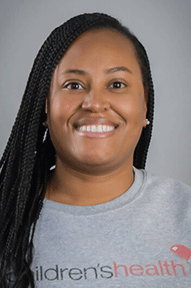Dallas
Cardiac Intensive Care Unit
Acute Care Cardiology Unit
214-456-8165
Newborn Individualized Developmental Care and Assessment Program, also known as NIDCAP, is an approach to intensive care that aims to make being at the hospital as supportive as possible for babies and their families. NIDCAP is a philosophy used during interactions with a baby to observe and learn about how they're feeling so we can support and improve their care. This compassionate approach helps babies heal faster, go home sooner, and reflects our dedication to providing the best possible care for each child.
Cardiac Intensive Care Unit
Acute Care Cardiology Unit
214-456-8165
NIDCAP is an evidence-based approach to caring for infants in the hospital. This approach helps interpret a baby’s communication into ways caregivers can provide support. It shapes the way each provider interacts with your child.
Our goal is to take the information your child is giving us and use it to create a personalized care plan for them. For instance, we may have a parent talk softly to the baby and hold their hand during a diaper change to help them relax. We want every interaction with your child to be as positive as possible to reduce stress and improve healing.
Studies show the NIDCAP approach has many benefits for children in intensive care, such as:
The NIDCAP approach assists in helping parents learn how to understand what their baby is communicating so they can meet their baby’s needs.
Our NIDCAP trained providers will observe your baby as they receive care in the ICU. They’ll watch how your baby responds to experiences like diaper changes, feedings and lab draws. Based on what they see, they’ll work with you and the staff to make a supportive plan for your infant.
We encourage parents to be involved with care. Your child knows your voice, even from before birth, and finds it soothing and comforting. Even just talking to your child through interactions can help them feel more relaxed.
Our NIDCAP trained providers will collaborate with the nursing staff, respiratory therapists, physicians and other caregivers to implement individualized supportive measures for your baby through one-on-one training.
As we continue to listen to your child's responses and adjust their care, you may find your child seems more at ease in the hospital which promotes their recovery process. If you ever have concerns, we encourage you to ask one of your child’s caregivers for support.


Children’s Health Cardiac Intensive Care Unit is working toward NIDCAP certification. As a standard of care to the NIDCAP approach, Children’s Health has NIDCAP developmental specialists that serve as support personnel to patients and their caregivers to aid in a supportive hospital experience.